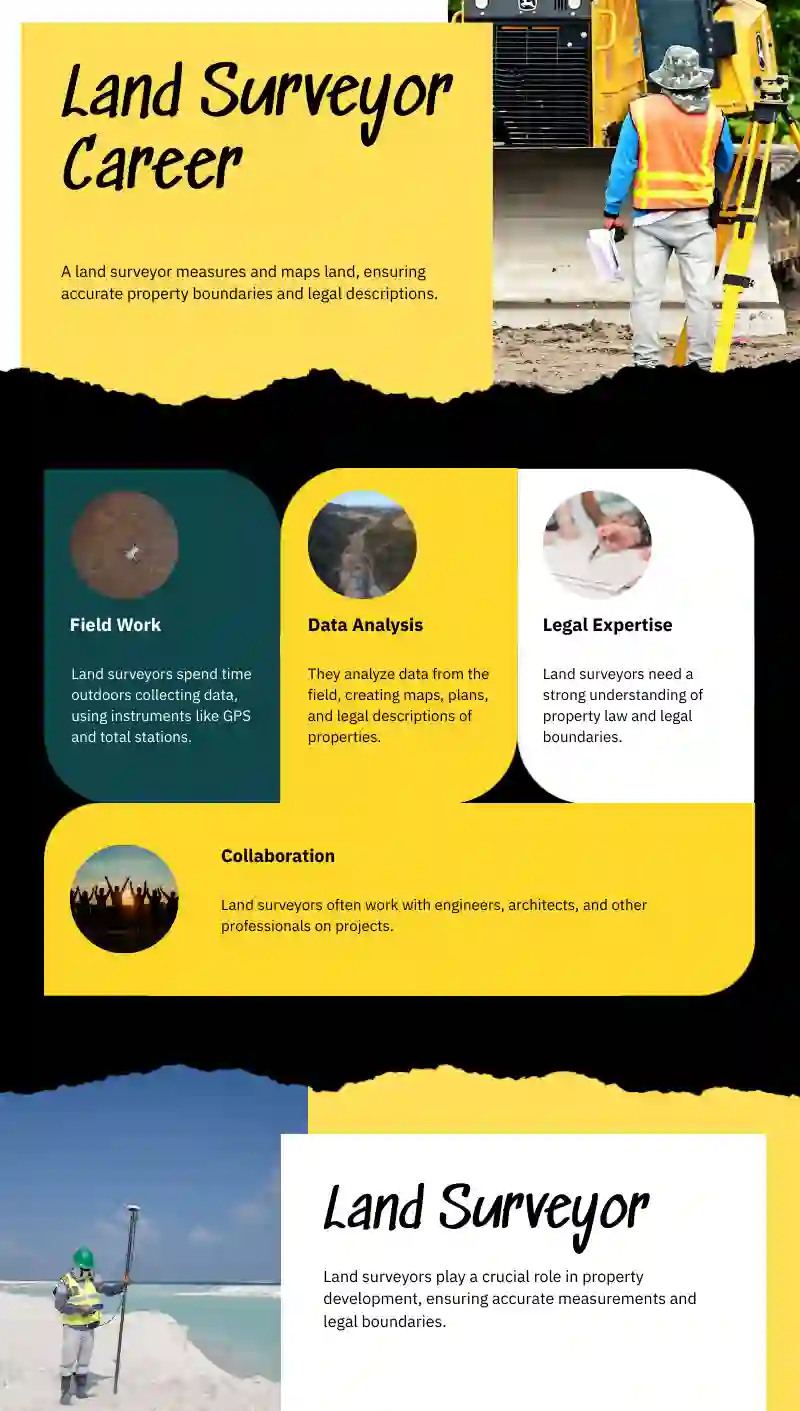Introduction-
I am a professional Civil Surveyor, and my experience is 10 years, how to become a land surveyor, I am studying the research about it, and I am keeping it in front of you.
If you’ve ever dreamed of a job that combines precision, creativity, and a touch of adventure, you’re in the right place. In this friendly, step-by-step guide, we’ll explore everything you need to kickstart your career.
Becoming a land surveyor in 2025 is more than just choosing a career—it’s embarking on an exciting journey where technology meets the great outdoors.
an essential profession that combines a blend of science, technology, and outdoor work, offering both job stability and the satisfaction of contributing to the development of communities.
In this article, we’ll explore how to become a land surveyor, outlining the education, skills, licensing requirements, and career prospects in this growing field.

Table of Contents

1. What is a Land Surveyor?
Before diving into how to become a land surveyor” let’s first understand what a Surveying Technician does.
A land surveyor is a specialist who measures and maps the physical land and characteristics of a given location. They determine property boundaries, topography, and the relationship between land and structures.
Their work plays a crucial role in real estate, construction, environmental management, and urban planning. Land surveyors also provide critical data for property disputes, land developments, and even designing roads or bridges.
2. Skills Required to Become a Surveying Technician
Becoming a successful Surveying Technician requires a combination of technical, analytical, and physical skills. Here are the important skills you should develop:
2.1. Attention to Detail how to become a Surveying Technician
Surveying Technicians must be able to measure accurately and pay attention to every small detail. A slight error in measurements can cause significant problems in property lines, construction, and legal disputes.
2.2. Mathematical Proficiency
Surveying Technicians regularly work with measurements, angles, and calculations. A strong understanding of geometry, trigonometry, and algebra is essential to the job.
2.3. Strong Communication Skills
Surveyors need to communicate effectively with clients, engineers, architects, and government officials. Whether it’s interpreting legal documents, writing reports, or explaining findings, communication is key to ensuring that all parties understand the project’s specifications.
2.4. Technological Knowledge
Modern land surveying heavily relies on advanced technology, such as GPS, GIS, Total Stations, and drones. A Surveying Technician must be tech-savvy and stay updated on the latest tools and software in the field.
2.5. Physical Endurance
Land surveying sometimes requires working outside in various weather conditions. It’s important to be physically fit and prepared to work long hours on-site, sometimes in challenging terrains.
3. Educational Requirements for Land Surveyors
To become a Surveying Technician, certain educational qualifications are required. Here’s a step-by-step breakdown:

The image captures the blend of technology and data analysis, highlighting the role of digital tools in land surveying.
3.1. High School Diploma or GED
The first step in becoming a surveying Technician is to complete your high school education or obtain a GED. High school courses in mathematics, physics, and computer science can provide a good foundation for pursuing a career in land surveying.

This modern infographic-style image represents the diverse skills and tools essential for a career in land surveying.
3.2. Earn a Degree in Land Surveying or Related Field
While some Surveying Technicians start with an associate degree, a bachelor’s degree in land surveying, civil engineering, or geomatics is often preferred by employers. These programs usually take four years and cover subjects such as:
- Geodesy (the science of measuring the Earth)
- Surveying Techniques and Instruments
- Cartography (mapmaking)
- Environmental Science
- Legal Aspects of Land Surveying
- Computer-Aided Design (CAD) and GIS
These courses provide the technical skills required to conduct the exact work.
3.3. Internship or Fieldwork Experience
Most land surveying degree programs require students to complete internships or fieldwork. This hands-on experience is critical to acquiring the practical abilities required for the job.
During your internship, you will work alongside experienced surveyors, learning how to use surveying instruments, interact with clients, and solve real-world surveying challenges.
4. Licensing and Certification Requirements
One of the critical steps in becoming a Surveying Technician is obtaining the proper licenses and certifications. These are typically required by law to practice as a professional surveyor. The exact requirements vary by state or country, but here’s a general guideline:
4.1. Fundamentals of Surveying (FS) Exam
In the United States, Surveying Technicians typically must pass the Fundamentals of Surveying (FS) exam. This exam assesses your knowledge of the basic principles of surveying, including measurement techniques, legal requirements, and technical concepts. You’re eligible to take this exam after completing your degree program.
4.2. Professional Surveyor Exam
Once you’ve passed the FS exam and gained work experience, the next step is to take the Principles and Practice of Surveying (PS) exam. This exam tests your advanced knowledge of surveying techniques and the legal aspects of the profession.
4.3. State-Specific Licensure
In most regions, after passing the FS and PS exams, you must apply for licensure in your specific state or country. Licensure ensures that you are legally recognized to work as a professional surveyor.
4.4. Continuing Education
Many states or countries require land surveyors to complete continuing education to keep their licenses active. This can include attending workshops, seminars, or courses that update surveyors on new technology, regulations, and industry practices.
5. Career Opportunities and Job Prospects
Once you’ve completed your education and licensing requirements, you’re ready to embark on a career as a Surveying Technician.
Here are some of the careers By delving into these resources, you can acquire a comprehensive understanding of the field and the steps necessary to pursue a successful career as a land surveyor.
opportunities available to you:
5.1. Private Surveying Firms
Many Surveying Technicians choose to work for private surveying firms, where they offer services to clients in various industries, including real estate, construction, and urban planning.
5.2. Government Agencies
Surveyors also work for government agencies at the local, state, or federal level. They may be involved in public infrastructure projects, such as highways, bridges, or land conservation programs. These positions often provide good job stability and benefits.
5.3. Construction and Engineering Companies
When deciding whether or not to develop something on a piece of land, surveyors who work in the engineering and construction industries are indispensable.
They work closely with engineers, architects, and contractors to ensure that the project is aligned with property boundaries and complies with zoning laws.
5.4. Self-Employment
Some experienced people have decided to start their surveying businesses. As a self-employed surveyor, you can take on private projects, provide consultations, and even expand your services to offer land development planning or geospatial services.

5.5. Specialized Roles
As a land surveyor, you can also specialize in specific areas such as:
Geodetic Surveying: Working with large-scale projects involving the measurement of the Earth’s surface.
Mining Surveying: Surveying land for mining operations.
Hydrographic Surveying: Measuring bodies of water for navigation or flood planning.
Specializing in one of these fields can lead to higher pay and career advancement opportunities.
6. Salary and Job Outlook.
The demand for skilled Surveying Technicians is expected to grow as urban development, construction projects, and infrastructure improvements continue.
According to the U.S. Bureau of Labor Statistics (BLS), the median annual wage for land surveyors was approximately $70,000 as of 2021, with the top 10% earning more than $100,000 per year.
Your earnings will depend on factors such as location, experience, and the specific industry you work in.
Conclusion
Embark on your journey to becoming a land surveyor by following these steps. You can establish a successful career in this essential profession by obtaining the necessary education, gaining practical experience, and obtaining the required certifications.
Whether you choose to work for a private firm, a government agency, or start your own business, the field of land surveying offers numerous opportunities for growth and advancement.
So, if you’re detail-oriented, enjoy working with technology, and love exploring the outdoors, land surveying might just be the career for you!
FAQ: land surveying career
1. What qualifications do I need to become a Surveying Technician?
To become a Surveying Technician, you typically need a high school diploma or GED, followed by a degree in land surveying, geomatics, civil engineering, or a related field. You will also need to pass licensing exams and gain fieldwork experience.
2. How long does it take to become a land surveyor?
Generally takes 4-6 years. This includes obtaining a bachelor’s degree (typically 4 years) and gaining work experience (usually 2-3 years) before taking the licensing exams.
3. What skills are essential
Key skills for a land surveyor include attention to detail, mathematical proficiency, strong communication abilities, technological knowledge, and physical endurance to handle outdoor work in various conditions.
4. What is the salary?
The salary of a land surveyor varies by experience, location, and industry. around in india 20k -120k monthly .
5. Do land surveyors need to be licensed?
A license is required for Surveying Technicians in the majority of nations. This typically involves passing the Fundamentals of Surveying (FS) exam, followed by the Principles and Practice of Surveying (PS) exam, and meeting other state-specific requirements.
6. Can a land surveyor work outdoors?
Yes, Surveying Technicians often work outdoors as part of their job. They collect data on-site, measure land features, and work in various terrains.
It requires physical stamina to handle long hours and sometimes challenging weather conditions.
7. How can I gain experience
You can gain experience by completing an internship or fieldwork as part of your degree program. After graduation, working as a surveyor assistant or in entry-level positions will help you build the experience needed to pass the licensing exams.
- Measurement Units for Length: A Complete Guide for Everyone - February 14, 2025
- LiDAR and Drones in Surveying: The Ultimate 2025 Guide - February 4, 2025
- “Ultimate RTK GPS 2025 How-to Guide: Step-by-Step Instructions” - January 26, 2025

